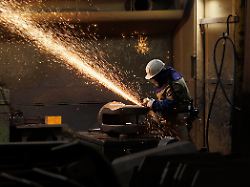Longest downturn since 2008
Industry is not getting going – recession more likely
December 7, 2023, 11:33 a.m
High energy prices and a weak global economy have German industrial companies firmly in their stranglehold. In October, production fell for the fifth time in a row. This last happened during the financial crisis. Economists do not expect a quick turnaround.
German industry is in the longest negative streak in a decade and a half: In October, German companies cut production for the fifth month in a row. This means a recession is getting closer. Industry, construction and energy suppliers together produced 0.4 percent less than in the previous month, as the Federal Statistical Office announced. Economists, on the other hand, had expected an increase of 0.2 percent, after a decline of 1.3 percent in September. The last time there were five declines in a row was in the year of the financial crisis in 2008.
As a result, production has fallen to its lowest level since the pandemic, said economic expert at the German Chamber of Commerce and Industry (DIHK), Jupp Zenzen. “It’s not just the energy-intensive industry that is experiencing declines, the construction industry is also being slowed down by high interest rates and the shortage of skilled workers.”
This threatens Europe’s larger economy with a new recession. “With the renewed decline, the probability has increased that the gross domestic product will also shrink in the final quarter of the year,” said the scientific director of the Institute for Macroeconomics and Economic Research (IMK), Sebastian Dullien. “According to the common technical definition of a recession as two consecutive quarters, Germany would currently be in recession again.” The economy had already shrunk in the summer, albeit only by 0.1 percent.
“Energy costs are a heavy burden”
Bridge days and vacation days may have played a certain role in October, as the Federal Ministry of Economics emphasized. “But even without these special effects, the economic situation remains weak.” Economists do not expect a quick turnaround. “Industrial production is likely to continue to decline in the coming months,” said Commerzbank chief economist Jörg Krämer. “Companies have to react to the recent slump in incoming orders after they have processed the orders that were left behind during Corona.” Added to this is the uncertainty caused by the budget crisis – which is not helpful in this context.
The export-dependent industry alone produced 0.5 percent less in October than in the previous month. This is largely due to mechanical engineering: production here fell by 6.3 percent. In contrast, the automotive industry reported growth of 0.7 percent. The export-dependent industry has recently lost orders: from August to October, new business was 4.6 percent lower than in the previous three months.
“The increased energy costs in the wake of Russia’s war of aggression against Ukraine are a heavy burden for Germany,” said VP Bank chief economist Thomas Gitzel. “It’s not just private households that are burdened, but above all industry too.”
